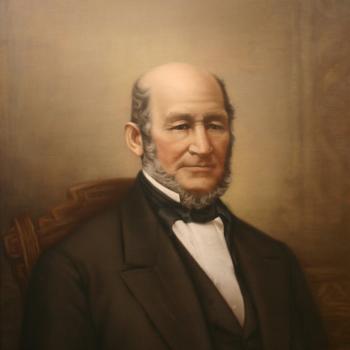 This past weekend, Mumford & Sons were on SNL singing their debut song from their new album Babel: “I Will Wait.” It was an awesome performance and if you want to watch a video of them singing the song live this is incredible.
This past weekend, Mumford & Sons were on SNL singing their debut song from their new album Babel: “I Will Wait.” It was an awesome performance and if you want to watch a video of them singing the song live this is incredible.
I want to think about the eschatology of Colossians with Mumford & Sons in a minute, but it would help if we were all on the same page about the song, so read the lyrics below.
And I came home
Like a stone
And I fell heavy into your arms
These days of dust
Which we’ve known
Will blow away with this new sun
And I’ll kneel down
Wait for now
And I’ll kneel down
Know my ground
And I will wait, I will wait for you
And I will wait, I will wait for you
So break my step
And relent
You forgave and I won’t forget
Know what we’ve seen
And him with less
Now in some way
Shake the excess
But I will wait, I will wait for you
And I will wait, I will wait for you
And I will wait, I will wait for you
And I will wait, I will wait for you
So I’ll be bold
As well as strong
And use my head alongside my heart
So take my flesh
And fix my eyes
That tethered mind free from the lies
But I’ll kneel down
Wait for now
I’ll kneel down
Know my ground
Raise my hands
Paint my spirit gold
And bow my head
Keep my heart slow
There has been some discussion online about whether the “you” is a girlfriend or is their Lord. I have heard that Mumford draws often from Christian imagery and there is much of that here: kneeling, relenting, forgiveness, flesh, revelation, etc…
Let’s just say that it is a song about the Lord (my own hat-tip to reader-response reading???) – two themes strike me as prominent: humility/penitence and vigilance. The first stanza focuses on the “days of dust” which probably is reminiscent of the frailty and evanescence of humanity and life. Even kneeling itself could be shown as a sign of lowliness – I kneel to better “know my ground.”
However, the writer’s desire to “wait” gives a sense of urgency and expectation -wait for what? Why “for now”? In the last stanza we see the language of courage (boldness, strength, concentration, freedom). Could the waiting be about the great “reversal” that will take place in the future – but for now vigilance is necessary? This would make good sense of “for now” in the chorus. Now is a time for two things: humility and alertness (“use my head alongside my heart” and “fix my eyes”).
Now let’s turn to Colossians. There is a long history of argumentation that sees Colossians as reflecting “realized eschatology” – the privileges and gifts of the coming age are all here now.
– the “rescue” is in the past (1:13)
-raised with Christ (3:1)
-died with Christ, hidden (3:3)
-clothed with new self (3:10)
However, and this is where Mumford comes in, when we look for the evidence, we see that Colossians is very much focused on the future. It is the mystics who are not a waiting people- they want to “have it all now.” Colossians encourages a “continuing on” (2:6) – much like the one that Mumford endorses. Believers look ahead to “what is to come” (2:17).
Believers also need humility (3:12) – working together and relying on each other. We remember forgiveness (particularly as freedom) and we are thankful (1:14).
One of the understudied parts of Colossians is the final words in 4:2-6. Far from being perfunctory “end of letter” advice, these are the last statements that the author wants the auditors to keep in mind: get busy praying and “be alert” (4:2). Be vigilant. There is no time to mess around. We live in days of dust (remember the purported author was in chains awaiting an uncertain fate). I think the author was using “alertness” language that is meant to remind one of Jesus logion regarding the return of the Son of Man (Mark 13:32-37). In Mark 13:37, at the conclusion of this “Parousia of the Son of Man” discourse, Jesus’ final words are: “And what I say to you I say to all: Keep awake!”
Be strong. Be courageous. Don’t let laziness, or anger, or distraction get the best of you. Wait. But wait on your heels. Wait at the ready. Wait…but only “for now.”
Scholars already detected the themes of humility and eschatological vigilance in Colossians long before Mumford & Sons came along, but what I found profound is the way these themes are brought together into one place in “I Will Wait.” There is a dialectic tension between power and weakness in this song that one could associate with Colossians. Waiting can sometimes be a sign of weakness (as in hesitancy), but when one knows the exact time to strike, waiting is a sign of shrewdness. Knowing when to kneel and be still is also a testament to recognizing personal weakness -I don’t act now, by myself, because I am but dust – I cannot accomplish it all on my own. And yet the kneeling could be a position of readiness and leverage for when the “time is right.”
Colossians is trying to counter-act a kind of self-centeredness that stems both from fear (obsession over safety) and also vanity (look at me, look at me, I have the coveted secret). Humility is required to deconstruct the all-important “self.” However, humility should not degrade into a kind of “woe in me” meekness that prevents the self from seeing God’s empowerment and call to action. Colossians’ final words on vigilance already presumes that the vigilante (!) is important and effective! So, Colossians does contain an element of that same eschatological anticipation that we see in “I Will Wait” – a willingness to live in a state of humility and alertness.
Thank you Mumford & Sons. I just ordered your new album…















